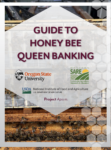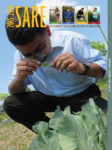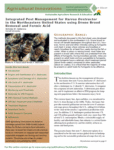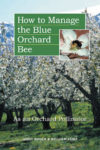The educational materials listed on this page are about Bees.
Apiculture is the management of bees for the purpose of bee breeding, insect pollination and honey production. Honey bees, among other native and non-native bees, are important to agriculture because of their role in crop pollination. Bee pollinated crops will more readily flower and fruit. Aside from bees, there is an entire list of pollinators that aid in serving this important ecological function. One threat to bees are bee diseases. Honey bee diseases can overcome a hive when a pest is introduced, therefore bee pest control is critical. Bee parasites are another threat to bee health, so it is important to find honey bee information that is geared toward your region, climate and other environmental issues. To combat diseases and boost production, some producers have honey bee breeding enterprises to maintain healthy populations. Finally, one of the most important ways to help increase bee production is to grow plants for pollinators. Key practices include pollination, beekeeping, pollinator health, pollinator habitat, honey, cultural control, integrated pest management.
The Cover Crops Topic Room provides information on how to improve crop diversity in order to attract pollinators. Cover Cropping for Pollinators and Beneficial Insects is a helpful bulletin to guide practices that utilize cover crops for multiple beneficial uses, including pollination. SARE’s book How to Manage the Blue Orchard Bee is a resource that provides practical information on best practices for blue orchard bee management to increase orchard production. Managing Alternative Pollinators explains how to manage your farm or ranch to encourage pollinators other than the honey bee.
Showing 1-4 of 4 results

Guide to Honey Bee Queen Banking
This guide will walk you through the step-by-step process of establishing and maintaining a queen bank. The guide starts with the basics and walks the reader through each step to create a successful honey bank that includes a queen bee. Because queen bees are so critical in maintaining a bank, beekeepers center their focus on […]

2015/2016 Report from the Field
Read about SARE-funded work in the areas of sustainable dairy cropping systems, soil health assessments, nutrient management, cover crops, beginning farmers, pollinators, technical assistance programs for women farmers, and more. This edition includes highlights of projects funded through the graduate student program, and the highly regarded Sustainable Agriculture Fellowship, a professional development program coordinated by SARE and NACAA.

Integrated Pest Management for Varroa Destructor in the Northeastern United States using Drone Brood Removal and Formic Acid
This bulletin focuses on the management of the parasitic honey bee mite Varroa destructor (V. destructor) in the northeastern U.S. It contains information that will allow a beekeeper to: 1) identify V. destructor, 2) recognize the symptoms of mite infestation, 3) determine pest densities, and 4) implement an effective IPM program for keeping mite populations below the economic injury level.

How to Manage the Blue Orchard Bee
How to Manage the Blue Orchard Bee explains how to use this alternative pollinator successfully, including nesting, rearing and wintering, how to manage predators, and more. Available only online.